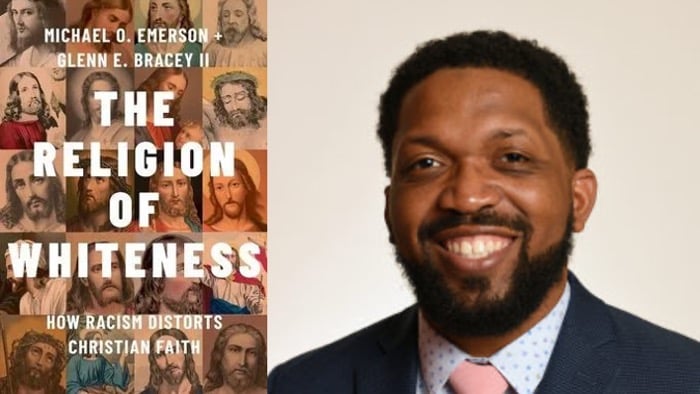The Religion of Whiteness
Christian nationalism, betrayal trauma, and venerating whiteness

Today I’m sharing an interview with Dr. Glenn Bracey, co-author with Michael Emerson of the important new book, The Religion of Whiteness. I’ve benefited from Dr. Bracey’s work for a number of years; his description of “race tests” has helped me see how racial exclusion persists in majority white and multiracial congregations. My thanks to Dr. Bracey for answering the following questions. I hope what you read here prompts you to pick up the book!
Christian Nationalism is in the news regularly these days. What is the relationship between Christian Nationalism and what you identify in your book as the Religion of Whiteness?
The Religion of Whiteness (ROW) encompasses but is much broader than white Christian Nationalism. White Christian Nationalism is “a political ideology and a cultural framework that idealizes and advocates for a fusion of symbols of Christianity with American civic life…” (Emerson and Bracey 2024:51). That ideology manifests in individuals’ beliefs and attitudes about religion and a range of other topics (e.g. immigration reform, police brutality). Christian Nationalism is undoubtedly part of the ROW.
However, white Christian Nationalism is just one of six related but distinct core beliefs of the ROW. Other beliefs are: white culture and values are superior to others’ cultures and values; white dominance is natural and condoned by God; white understandings, theologies, and actions should be centered as normal and universal; a separation exists between Christian identity and questions of social inequality; and Black people and Black culture are the inferior opposites of their white counterparts.
Because the ROW is a whole religion, it is more than just beliefs and attitudes. It also includes practices and a complex set of organizations that uphold the ROW. Practices include things like highly selective use of Christian scriptures and veneration of (pro-white) sacred symbols (e.g. white Jesus). These practices occur in and around Christian organizations like churches, universities, parachurches, media conglomerates, and lobbying firms that sustain the ROW.
In short, you can think of the ROW as the collective worship of whiteness and whites’ dominance, and you can think of white Christian Nationalism as the politicization of the ROW.
Because the Religion of Whiteness functions like, as you say, a whole religion, its effects can be especially pernicious. Borrowing from the work of Anita Phillips and Jennifer Freyd, you write that "betrayal trauma" is one of those impacts. What is betrayal trauma and who does it impact the most?
Quoting psychologist Jennifer Freyd, “Betrayal Trauma occurs when people or institutions on which a person depends significantly violate that person’s trust or well-being” (Emerson and Bracey 2024:8). Because Christians often depend on churches for spiritual guidance, friendships, education, and other core functions of life, churches can be frequent sites of betrayal trauma.
That is especially true for Christians of color in majority white or multiracial churches. Christians of color make huge sacrifices to pursue the multiracial kingdom of God they believe scripture has called them to. They sacrifice the comforts of home-church traditions, relationships with people in their racial group, and spiritual nurturing that attends to all parts of their lives--including the hardships of racism. They make these sacrifices believing that white Christians are likewise committed to forming communities where all are nurtured and cared for, regardless of race. When, after time, Christians of color discover that whiteness is being nurtured in the church and that their nonwhite culture and experience are not only not being attended to, but are actively shunned and discouraged, these Christians of color experience betrayal trauma.
Because this betrayal happens in religious spaces, betrayal trauma causes much spiritual damage. Betrayed Christians have a hard time reconnecting with God when the people of God have hurt them so deeply.
Let's talk more about why the damage inflicted in religious spaces. You write that "whiteness is a wholly real spiritual force, the guiding force of a massive, powerful people group." In what ways does whiteness function as a spiritual force and how does this differ from the social and interpersonal ways we typically interpret racial whiteness?
We typically interpret racial whiteness as an individual identity trait that affects people’s attitudes and life chances. By life chances, we mean how the government and other social institutions favor white people through a mix of policies and neglect.
When we’re talking about whiteness as a spiritual force, we mean something different. Founding sociologist, Emile Durkheim, noticed that when people are united and doing actions in concert, they experience a feeling of unity, harmony, and purpose that he called “collective effervescence.” I liken it to the difference between watching sports at home alone versus being in a stadium when the home team scores. It’s just a different feeling.
It is the power of the group that generates the feeling of collective effervescence. People are attracted to that feeling, but they do not realize it comes from connection to the group. Instead, they often attribute the feeling to an abstract power, perhaps a spirit or a god that represents the group.
Our argument in the book is that millions of people, including about two-thirds of white practicing Christians, are experiencing collective effervescence around whiteness and white people’s dominance relative to other racial groups. Symbols, such as white Jesus, that represent white people as a group become representations of whites’ dominance. When whiteness and God are conflated--via white Jesus, white Christian Nationalism, or other methods--people can find themselves experiencing collective effervescence around whiteness and thus worshiping whites’ dominance as a group. Thus, whiteness becomes the central spiritual force that is felt and venerated.
Setting aside your sociologist's hat for a moment, how has this research affected your relationship with American Christianity?
This research was difficult to gather and process. I knew the Church was struggling with race, but it was shocking to see how many Christians, especially whites, put aside their Christian commitments whenever their racial politics are challenged.
Even though I am a sociologist and I focus on social trends, I realize now that I had long employed an individualist defense mechanism to protect myself from the shock and hurt of knowing that so many of my Christian siblings were more interested in white supremacy than Christianity. I wanted to believe that my experiences had been unique to me or the Christian organizations I participated in. That self-protective story only masked the truth and delayed the inevitable.
It was emotionally crushing to hear so many stories of betrayal trauma and racist attacks within the Church. It reminded me of some of my worst experiences as a Black Christian in a majority white church. Several times I was deeply saddened to see just how diligent and aggressive many white Christians were to defend whiteness from challenges by Christians of color.
Honestly, reflecting on the research has made me hesitant about a lot of Christian groups and activities. When you acknowledge that two thirds of white practicing Christians are practicing the Religion of Whiteness, you realize that the Christian world on which you can depend is much much smaller than previously believed. I cannot assume that white Christians will fellowship with me, much less nurture my spirit. It’s an enormous loss, and it’s very painful.
The whole experience has driven me to difficult places in my faith. It took years to try and get the whiteness out of my doctrine and view of God. The ROW had tried to seduce me, too. Separating ROW teachings from Christ’s teachings was hard intellectually, emotionally and spiritually.
What gives me hope is the Remnant, that one third of white practicing Christians who resist the ROW and join with Christians of color in a multiracial view of the kingdom of God. Just knowing they exist in significant numbers helps me feel like working for the kingdom is worthwhile and not a deluded attempt to be unified with people who reject me out of hand.
The View From Here

Race Against Gun Violence
I’m so close to my fundraising goal for the upcoming race to benefit New Community Outreach. Thanks everyone! If you appreciated my interview with Dr. Bracey, would you consider a small gift to help me cross the finish line?